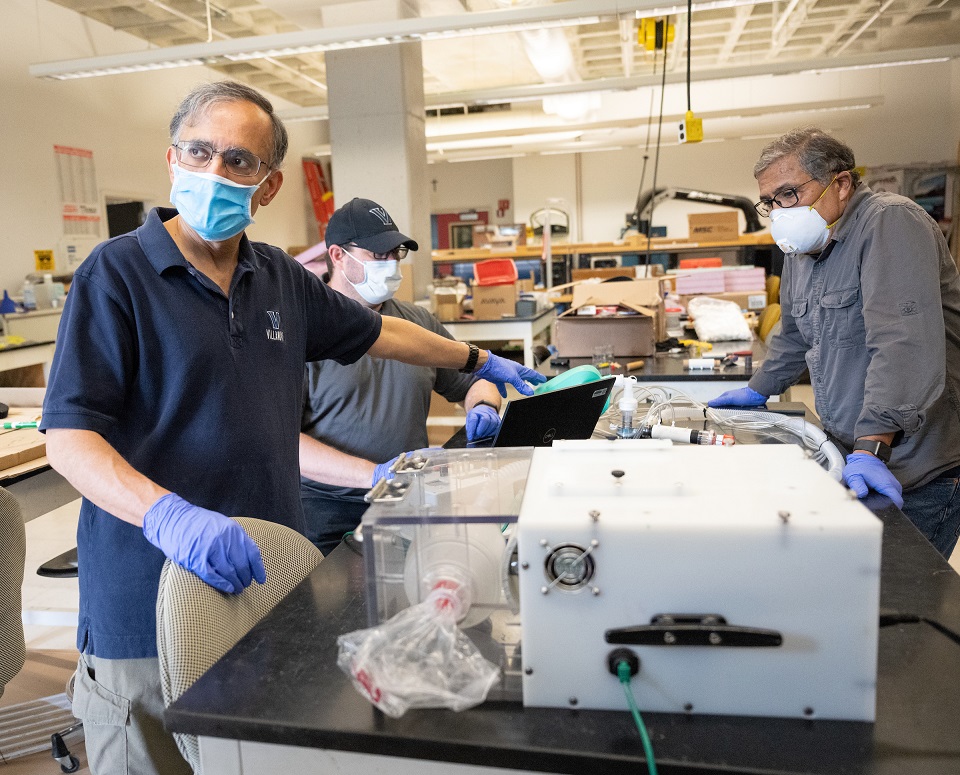Villanovans Launch Low-cost Ventilator Initiative
Villanova Engineering Professor Dr. C. Nataraj has assembled a team of engineering faculty, industry professionals and graduate students from Engineering and Nursing to work with medical experts on the project.

Ventilator team members (pictured left to right): Engineering professors Dr. C. Nataraj, Dr. Garrett Clayton and Dr. Alfonso Ortega.
Ventilators are essential in keeping severely ill coronavirus patients alive, but hospitals nationwide are facing a critical shortage of the life-saving medical device amid the rapidly spreading nature of the virus and the amount of time an infected patient requires the machine. The Society of Critical Care Medicine has projected that 960,000 coronavirus patients in the US may need to be put on ventilators during the outbreak, but the organization estimates that there are only about 200,000 of the devices.
Villanova University College of Engineering Professor C. Nataraj, PhD, has assembled a team of fellow engineering faculty, industry professionals and graduate students from the College of Engineering and the M. Louise Fitzpatrick College of Nursing to work with medical experts from Geisinger Health System and Children’s Hospital of Philadelphia to design, develop, test and validate a low-cost (< $800) ventilator to address the region’s needs. The goal is to design a device that is safe, robust, scalable (to produce in large numbers), and meets the minimum performance requirements for the treatment of COVID-19 patients. The Fitzpatrick College of Nursing has provided critical supplies needed for testing the designed prototype.
Seeking parts that are readily available in the supply chain (using as few sophisticated components as possible) is expected to speed assembly, thereby addressing the dire situation as quickly as possible. According to Dr. Nataraj, the objective is to have a prototype ready and validated by ECRI Institute by mid-April. The team is in conversation with the Pennsylvania Department of Community and Economic Development about engaging local industry in the manufacturing and distribution of the finished ventilators. In addition to saving lives, this operation should contribute to stimulating the local and state economy.
In keeping with the University’s Augustinian mission, the engineering team has the goal of making the complete ventilator design, including the computer codes, open source, enabling anyone to make the devices rapidly and with the same performance and reliability. There is a worldwide open source effort to develop these devices.
Dr. Nataraj notes that this project continues to evolve rapidly, and further updates will be made as details become available.
MEDIA COVERAGE
Villanova's ventilator initiative has gotten media coverage both locally and nationally. Below is an overview of the media coverage to date:
As Coronavirus Spreads Globally, These Researchers Are Designing Ventilators That Cost Less Than $1,000, Forbes, 4/30/20
PA’s hospitals, universities, and companies fight COVID-19, Keystone Edge, 4/20/20
CHOP spinoff, Villanova professor share the same goal: Produce a low-cost ventilator, Philadelphia Business Journal, 4/13/20
Villanova teams up with Philadelphia-area hospitals to build low-cost emergency ventilators, KYW 1060 AM, 4/7/20
VENTILATOR TEAM MEMBERS:
ENGINEERING TEAM
Dr. C. Nataraj, Moritz Professor of Engineered Systems, Mechanical Engineering, and director, Villanova Center for the Analytics of Dynamic Systems (VCADS)—team lead, control and modeling, certification, medical liaison. Dr. Alfonso Ortega, James R. Birle Professor of Energy Technology, Mechanical Engineering—fluid system and mechanical design. Dr. Garrett Clayton, associate professor, Mechanical Engineering, and director, Center for Nonlinear Dynamics & Control—control, sensing, system design. Christopher Townend, Mechanical Engineering lab manager—design, fabrication. Dr. Frank Ferrese ’06 MSCpE, ’13 PhD, Naval Surface Warfare Center —control, modeling. Dr. Philip Asare, Assistant Professor of Electrical and Computer Engineering, Bucknell University—computer user interface. Ken Salter, consultant—modeling and simulation. Dr. Patrice Tremoulet, Rowan University—human-machine interface. Dr. Foad Nazari, Research Scientist, VCADS—hazard operability analysis. Zack Nowosad—fabrication. Dr. Sridhar Santhanam, professor and chair, Mechanical Engineering—failure analysis. Graduate students: Carol Caceres, Felipe Valenzuela, Turki Haj Mohamad.
MEDICAL TEAM
Dr. Mark Poler, Anesthesiologist, Geisinger Health System. Dr. Todd Kilbaugh, Children’s Hospital of Philadelphia. M. Louise Fitzpatrick College of Nursing: Emily Hylton, Lucas Halliday, Shayla Davis. Villanova College of Engineering: Carol Caceres, Felipe Valenzuela.
COLLABORATORS
Nicholas DiLeo, TDI Technologies, Inc. Alexander Hisey, Southco.
ADMINISTRATIVE
Keith Argue, assistant dean of external relations.
